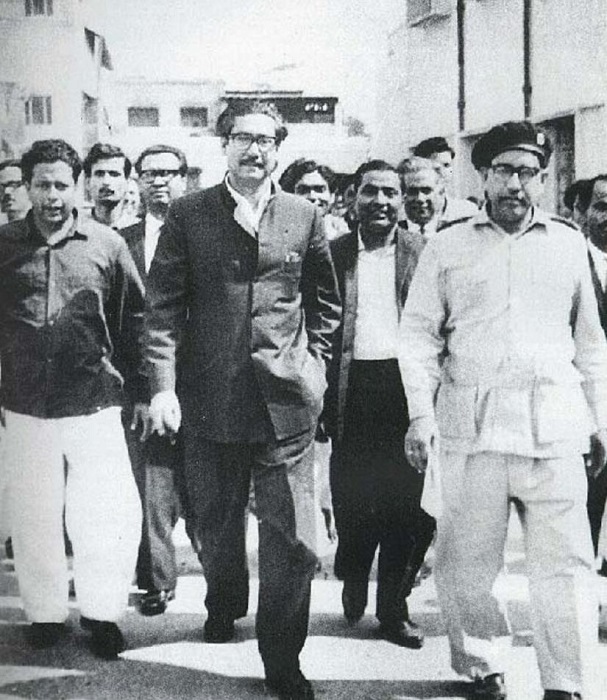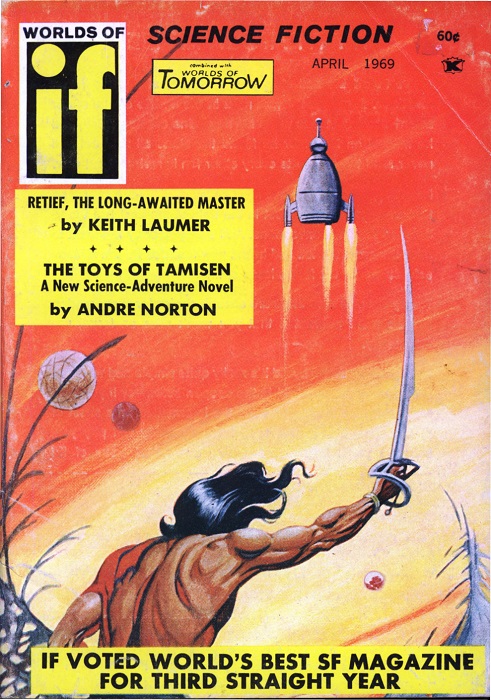
by David Levinson
A change is gonna come
Regular readers of Galactic Journey or of SF magazines in general may have noticed that neither Galaxy nor IF published last month. With a bit of detective work, I’ve put together what happened.
The clues are on the masthead. Editor Fred Pohl is now listed as Editor Emeritus, while the editor is Ejler Jakobsson. The publisher is no longer Robert M. Guinn, but Arnold E. Abramson, and Galaxy Publishing has been replaced by Universal Publishing. (That last worried me for a moment, but I quickly remembered that Amazing and Fantastic are put out by Ultimate Publishing under Sol Cohen.)
There’s also an editorial from Fred, talking about the changes. Most importantly, he’s stepping back to focus more on writing. That and the fact that he’s sticking around to look over the new editor’s shoulder (Fred’s words) for a while suggests his departure is voluntary and doesn’t suggest any misgivings about the new ownership on his part. Plus, we should be getting new stuff from him more often.
Who is Ejler Jakobsson? He had a few horror stories back in the late 30s, cowritten with his wife Edith, but if his name sounds familiar, it’s most likely because he was the editor for the revival of Super Science Stories from 1949-1951. Coincidentally, that magazine had been edited by Fred Pohl before it was shut down by wartime paper shortages.
What changes can we expect? Fred prefers to let us see them as they happen, but the promo for next month hints at some. IF is getting a book review column by Lester del Rey. That may or may not mean the end of his “If… and When” column. We’re also getting a twelve part series by Willy Ley, “The Story of Our Earth.” That might suggest some changes over at Galaxy.
Of course, the biggest question is what sort of stories Jakobsson will buy. It will be a while before we get a good feel for that, since there’s bound to be a backlog of stories selected by Pohl. It took several months for the Fermans over at Fantasy and Science Fiction to change the course set by Avram Davidson, but Ted White has wrestled Amazing and Fantastic into a new direction almost immediately. We’ll see, but we should have a good idea by the time we start the new decade.
A bang or a whimper?
Since this is the last issue under Fred Pohl’s leadership, it’s fair to ask what sort of note he goes out on. Will he put out a strong issue, go out on a high note and remind us why this magazine has won three straight Hugos? Or will it be utterly awful and make us glad he’s gone? Not to ruin the suspense, but the July issue is really just another typical, middle-of-the-road example. There’s some good stuff and some not so good. Let’s start with the cover.
 Art credited only as couresy of Three Lions, Inc. but actually by German artist Johnny Bruck.
Art credited only as couresy of Three Lions, Inc. but actually by German artist Johnny Bruck.
Continue reading [June 2, 1969] The ever-whirling wheel (July 1969 IF)

![[June 2, 1969] The ever-whirling wheel (July 1969 <i>IF</i>)](https://galacticjourney.org/wp-content/uploads/2024/05/IF-1969-07-Cover-495x372.jpg)
![[April 6, 1969] The Weight of History (May 1969 <i>IF</i>)](https://galacticjourney.org/wp-content/uploads/2024/03/IF-1969-04-Cover-500x372.jpg)
 A map showing the location of Chenpao/Damansky Island
A map showing the location of Chenpao/Damansky Island Chinese soldiers pose with their captured Russian tank
Chinese soldiers pose with their captured Russian tank The cover illustrates Groovyland and is credited as courtesy of Three Lions, Inc., but see below
The cover illustrates Groovyland and is credited as courtesy of Three Lions, Inc., but see below![[March 2, 1969] Dreams and reality (April 1969 <i>IF</i>)](https://galacticjourney.org/wp-content/uploads/2024/02/IF-1969-04-Cover-491x372.jpg)
 Ayub Khan greets LBJ in Karachi in 1967.
Ayub Khan greets LBJ in Karachi in 1967. Sheikh Mujib (center) emerges from prison.
Sheikh Mujib (center) emerges from prison. Like I said, swords and spaceships. Art by Adkins
Like I said, swords and spaceships. Art by Adkins